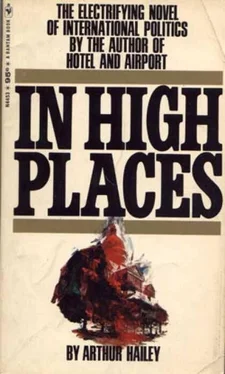Arthur Hailey - In High Places
Здесь есть возможность читать онлайн «Arthur Hailey - In High Places» весь текст электронной книги совершенно бесплатно (целиком полную версию без сокращений). В некоторых случаях можно слушать аудио, скачать через торрент в формате fb2 и присутствует краткое содержание. Жанр: Триллер, на английском языке. Описание произведения, (предисловие) а так же отзывы посетителей доступны на портале библиотеки ЛибКат.
- Название:In High Places
- Автор:
- Жанр:
- Год:неизвестен
- ISBN:нет данных
- Рейтинг книги:5 / 5. Голосов: 1
-
Избранное:Добавить в избранное
- Отзывы:
-
Ваша оценка:
- 100
- 1
- 2
- 3
- 4
- 5
In High Places: краткое содержание, описание и аннотация
Предлагаем к чтению аннотацию, описание, краткое содержание или предисловие (зависит от того, что написал сам автор книги «In High Places»). Если вы не нашли необходимую информацию о книге — напишите в комментариях, мы постараемся отыскать её.
In High Places — читать онлайн бесплатно полную книгу (весь текст) целиком
Ниже представлен текст книги, разбитый по страницам. Система сохранения места последней прочитанной страницы, позволяет с удобством читать онлайн бесплатно книгу «In High Places», без необходимости каждый раз заново искать на чём Вы остановились. Поставьте закладку, и сможете в любой момент перейти на страницу, на которой закончили чтение.
Интервал:
Закладка:
At the beginning they had lived, though meagrely, among other French nationals. Later, as they had become poorer still, the native quarter was all the home they knew. Then, when Henri Duval was six, his mother had died.
After his mother's death his memories were mixed again. For a time – it was hard to be sure how long – he had lived in the streets, begging for food and sleeping at night in whatever hole or corner he could find. He had never gone to the authorities; it had not occurred to him to do so, for among the circle he moved in the police were looked on as enemies, not friends.
Then an elderly Somali, living alone in a hovel in the native quarter, had taken him in and provided shelter of a sort. The arrangement had lasted five years and then, for some reason, the old man left and Henri Duval was alone once more.
This time he drifted from Ethiopia across into British Somaliland, getting work where he could, and for another four years he was variously a shepherd's helper, a goatherd, and a boat boy, eking out a precarious day-to-day existence with wages seldom more than food and shelter.
Then and later, crossing international borders had been simple. There were so many families with children on the move that officials at border points seldom bothered with the children individually. At such moments he would merely attach himself to a family and pass unnoticed through the guards. In time he became adept at it. Even in his late teens his small stature continued to make this possible. Until, at twenty, after travelling with some Arab nomads, he was stopped for the first time and turned back at the borders of French Somaliland.,
Two truths were now revealed to Henri Duval. One: his days of slipping across borders with groups of children were over. Second: French Somaliland, which until this moment he had regarded as his own country, was closed to him. The first thing he had already suspected; the second came as a profound shock.
Fatefully, inevitably, he had encountered one of the fundamentals of modern society: that without documentation – the all-important fragments of paper, the very least of which is a certificate of birth – man is nothing, officially non-existent, and belonging nowhere on the territorially divided earth.
If men and women of learning have, at times, found the proposition hard to accept, to Henri Duval – without schooling of any kind and forced through his years of childhood to live like an unloved scavenger – it had come with shattering impact. The Arab nomads moved on, leaving Duval in Ethiopia, where he now knew he had no right to be either, and for a day and a night he sat huddled near the border crossing point at Hadele Gubo…
… There was a fold of bleached and weathered rock. In its shelter the twenty-year-old youth – still a child in many ways – stayed unmoving and alone… Directly ahead were the arid, boulder-studded plains of the Somalilands, bleak in moonlight and barren in the bright noon sun. And across the plains, sinuously winding like a dun-coloured serpent, was the dust-blown roadway to Djibouti – the final tenuous thread between Henri Duval and his past, between his childhood and his manhood, between his body, undocumented except by its living presence, and the sun-baked coastal city whose fish-smelling alleyways and salt-encrusted wharves he had thought of as his birthplace and his only home.
'Suddenly the desert ahead seemed familiar and inviting ground. And like a creature drawn by some primeval instinct to the place of its birth and mother love, so he longed to return to Djibouti, but now it was out of reach, as so much else was out of reach and would remain so for always.
Then, thirst and hunger at last stirring him, he rose. He turned from the forbidden country, heading north, because he had to head somewhere, towards Eritrea and the Red Sea…
The journey into Eritrea, west coast territory of Ethiopia, was one that he remembered clearly. He remembered, too, that on this journey he first began to steal systematically. Previously he had stolen food, but only in desperation when begging or work had failed. Now he no longer sought work and lived by thievery alone. He still stole food whenever there was an opportunity, and also goods or trinkets which could be sold for small amounts. What little money he got seemed to disappear at once, but always in back of his mind was the thought of accumulating enough to buy a passage on a ship – to some place where he could belong and could begin life again.
In time he had come to Massawa, port of coral and gateway from Ethiopia to the Red Sea.
It was in Massawa that retribution for stealing came close to overtaking him. Mingling in the crowd near a fishmonger's stall, he had purloined a fish, but the keen-eyed merchant had observed and given chase. Several others in the crowd, including a policeman, had joined in and within seconds Henri Duval was being pursued by what, to his youthful frightened ears, sounded like an angry mob. At a desperately fevered pace he had led them around Massawa's coral buildings and through tortuous back streets of the native quarter. Finally, having gained enough headway to reach the docks, he had hidden himself amid bales of ship's cargo awaiting loading. From a peephole he had watched his pursuers search, then eventually give up and go away.
But the experience had shaken him and he resolved to quit Ethiopia by any means he could. In front of his hiding place a freighter was moored and after nightfall he crept aboard, stowing in a dark locker which he stumbled into from a lower deck. The vessel sailed next morning. Two hours later he was discovered and brought before the captain.
The' ship was an antiquated Italian coal burner, plying leakily between the Gulf of Aden and the eastern Mediterranean.
The languid Italian captain boredly scraped dirt from beneath his fingernails as Henri Duval stood, trembling, before him.
After several minutes had passed the captain asked a sharp question in Italian. There was no response. He tried English, then French, but without result. Duval had long forgotten the little French he had learned from his mother and his speech was now a polyglot hodgepodge of Arabic, Somali, and Amharic, interspersed with stray words from Ethiopia's seventy languages and twice as many dialects.
Finding he could not communicate, the captain shrugged indifferently. Stowaways were no novelty on the ship and the captain, unhampered by tiresome scruples about maritime law, ordered Duval put to work. His intention was to dump the stowaway at the next port of call.
What the captain had not foreseen, however, was that Henri Duval, a man without a country, would be firmly rejected by immigration officials at every port of call, including Massawa, to which the ship returned several months later.
With the increasing time that Duval spent aboard, the captain's anger increased in ratio until, after ten months had gone by, he called his bosun into conference. Between them they devised a plan – which the bosun obligingly explained to Duval through an interpreter – whereby the stowaway's life was to be made so untenable that sooner or later he would be glad to jump ship. And eventually, after something like two months of overwork, beatings and semi-starvation, that was precisely what he did.
Duval recalled in sharp detail the night he had slipped silently down the gangway of the Italian ship. It was in Beirut, Lebanon – the tiny buffer state between Syria and Israel where, the legend says, St George once slew his dragon.
He had left as he had come, in darkness; and departure was easy because he had nothing to take and no possessions except the ragged clothes he wore. Once disembarked, he had at first scurried through the dockyard, intending to head for town. But the glimpse of a uniform in a lighted area ahead had unnerved him and sent him darting back, seeking shelter in the shadows. More reconnaissance showed that the dockyard was fenced and patrolled. He felt himself trembling; he was twenty-one, weak from hunger, incredibly alone, and desperately afraid.
Читать дальшеИнтервал:
Закладка:
Похожие книги на «In High Places»
Представляем Вашему вниманию похожие книги на «In High Places» списком для выбора. Мы отобрали схожую по названию и смыслу литературу в надежде предоставить читателям больше вариантов отыскать новые, интересные, ещё непрочитанные произведения.
Обсуждение, отзывы о книге «In High Places» и просто собственные мнения читателей. Оставьте ваши комментарии, напишите, что Вы думаете о произведении, его смысле или главных героях. Укажите что конкретно понравилось, а что нет, и почему Вы так считаете.












